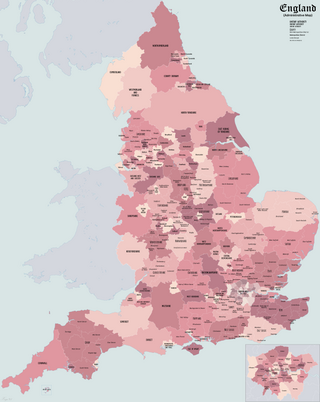Related Research Articles

Metropolitan counties are a subdivision of England which were originally used for local government. There are six metropolitan counties: Greater Manchester, Merseyside, South Yorkshire, Tyne and Wear, West Midlands and West Yorkshire.

The subdivisions of England constitute a hierarchy of administrative divisions and non-administrative ceremonial areas.

The West Midlands is one of nine official regions of England at the first level of International Territorial Level for statistical purposes. It covers the western half of the area known traditionally as the Midlands. The region consists of the counties of Herefordshire, Shropshire, Staffordshire, Warwickshire, West Midlands and Worcestershire. The region has seven cities: Birmingham, Coventry, Hereford, Lichfield, Stoke-on-Trent, Wolverhampton and Worcester.

The regional chambers of England were a group of indirectly elected regional bodies that were created by the provisions of the Regional Development Agencies Act 1998. There were eight regional chambers, one for each of the regions of England except Greater London, which had opted for an elected mayor and assembly in 1998. All eight regional chambers had adopted the title "regional assembly" or "assembly" as part of their name, though this was not an official status in law. The chambers were abolished over a two-year period between 31 March 2008 and 31 March 2010 and some of their functions were assumed by newly established local authority leaders' boards.

Birmingham, a city and metropolitan borough in the West Midlands, England, is the second-largest city in the United Kingdom.

The Learning and Skills Council (LSC) was a non-departmental public body jointly sponsored by the Department for Business, Innovation and Skills (BIS) and the Department for Children, Schools and Families (DCSF) in England. It closed on 31 March 2010 and was replaced by the Skills Funding Agency and the Young People's Learning Agency.

In the United Kingdom, regional development agencies (RDAs) were nine non-departmental public bodies established for the purpose of development, primarily economic, of England's Government Office regions between 1998 and 2010. There was one RDA for each of the NUTS level 1 regions of England. Similar activities were carried out in Wales by the Welsh Government Department of Economy and Transport, in Northern Ireland by the Department of Enterprise, Trade and Investment and in Scotland by Scottish Enterprise and Highlands and Islands Enterprise.
The regional arts boards were English regional subdivisions of the Arts Council of Great Britain

The East Midlands Regional Assembly was the regional chamber for the East Midlands region of the England. It was based at Melton.
The West Midlands Regional Assembly (WMRA) was the regional chamber for the West Midlands region of England, established in 1999. It was based in Birmingham. It was abolished on 31 March 2010, its functions transferring to West Midlands Leaders Board and to Advantage West Midlands.

Local authority leaders' boards are voluntary regional associations of council leaders that have been established in England outside of Greater London to replace certain functions of the now abolished regional chambers. The establishment of the boards was part of the UK Government's Review of Sub-National Economic Development and Regeneration. which brought forward the Government's plans to alter the structure of regional governance in England and was mandated by the Local Democracy, Economic Development and Construction Act 2009. In June 2010, the new Conservative-LibDem coalition government announced plans to remove funding from the new boards and to remove their statutory functions. It was indicated that the boards might continue as voluntary associations of council leaders.
South East Councils (SEC) is a voluntary association of council leaders from the 70 local authorities in the South East region of England. It is a regional grouping affiliated to the Local Government Association. It was established following the abolition of the South East England Regional Assembly in March 2009. From April 2009 to 2010 it had a statutory role in regional planning.

The North East Regional Employers' Organisation, previously the Association of North East Councils is a partnership body made up of representatives of local authorities in North East England. It acts as the regional employers organisation.
East Midlands Councils is a consultative forum for local government in the East Midlands region of England. It is a regional grouping of the Local Government Association and the regional employers organisation.
South West Councils is an association of council leaders from the South West of England. It is a regional grouping of the Local Government Association and the regional employers organisation.

The regions of England, formerly known as the government office regions, are the highest tier of sub-national division in England. They were established in 1994 and follow the 1974–96 county borders. They are a continuation of the former 1940s standard regions which followed the 1889–1974 administrative county borders. Between 1994 and 2011, all nine regions had partly devolved functions; they no longer fulfil this role, continuing to be used for limited statistical purposes.

A combined authority (CA) is a type of local government institution introduced in England outside Greater London by the Local Democracy, Economic Development and Construction Act 2009. CAs are created voluntarily and allow a group of local authorities to pool appropriate responsibility and receive certain devolved functions from central government in order to deliver transport and economic policy more effectively over a wider area. In areas where local government is two-tier, both must participate in the combined authority.
The East of England Local Government Association (EELGA) is an association of the 52 local authorities in the East of England. It is a regional grouping of the Local Government Association and the regional employers organisation. It was established in April 2010 following the abolition of the East of England Regional Assembly.
There are nine regional employers organisations in England, corresponding to the regions of England, and one each for Wales and Northern Ireland.

The West Midlands Combined Authority (WMCA) is the combined authority for the West Midlands metropolitan county in the United Kingdom. It was established by statutory instrument under the Local Democracy, Economic Development and Construction Act 2009. It is a strategic authority with powers over transport, economic development and regeneration. The authority formally came into being on 17 June 2016.
References
- ↑ "Malichimp (about)". campaign-archive.com. Retrieved 28 January 2024.
- ↑ "West midlands leaders board WMLB council leaders". Archived from the original on 18 April 2010. Retrieved 19 January 2010.
- ↑ "Regional groupings | Local Government Association". local.gov.uk.